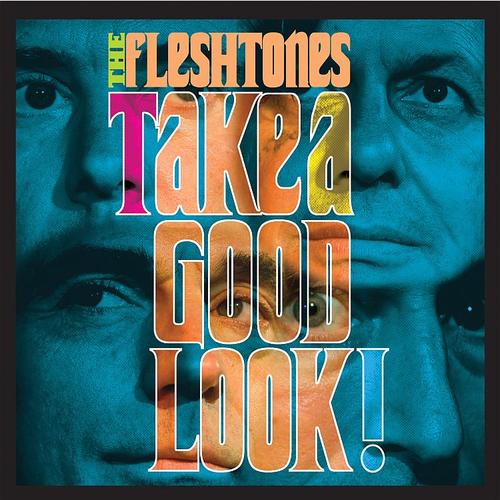DON’T LOOK NOW: THE FLESHTONES ESCAPE THEIR SECRET HISTORY
by Andy Turner
Since the television and movie writers are on strike, let’s imagine an episode of My Name is Earl in which Earl attempts to right his karma for once-upon-a-time screwing up the career of a promising band. We’ll keep it simple. Earl and his dimwit brother got drunk one night and stole the band’s equipment before the big record label showcase, forever dooming the musicians to local legend status. In order to check the band off his karma list, Earl secures for the band a major label record contract (turns out Crab Man was once an A&R man pre-Witness Protection Program — why the hell not?).
Guest stars as the band? The Fleshtones, of course, who know a thing or two about bad luck and deserving their due. But it seems like lately the Super-rockers — formed in 1976 — have been indeed delivered an Earl-like dose of good karma. In the past few months, a Fleshtones biography, tribute album, and new disc just out on Yep Roc, Take a Good Look, have all appeared. A documentary, Pardon Us For Living, But the Graveyard is Full, also is in the works.
“Tremendous,” is how Fleshtones front man Peter Zaremba describes his legendary NYC cult band’s getting to this point amid a turbulent career spanning more than 30 years.
Author Joe Bonomo, an English professor at Northern Illinois University, began writing Sweat: The Story of The Fleshtones, America’s Garage Band after a barroom conversation with the band in 2000. A longtime fan of the group, Bonomo says he believed The Fleshtones’ lengthy, bumps-and-bruises tale of Super Rock And How To Get It was truly remarkable.
“I realized that they were the only band from the storied mid-70s Bowery/punk scene that’s still together recording and touring without an inactive year, and I thought that it was a great tale of perseverance and pride and commitment in the face of ridiculous odds,” he says. “They outlasted the Ramones, they outlasted CBGB. They’ve become a New York legend, really. I wondered how the guys kept going and kept playing with such abandon and passion (and drinking). Plus, I knew that they’re really funny, interesting, New York through-and-through guys and that they’d led a pretty wild road life, and I figured that the stories would make for a great book.”
Bonomo was right, even though an initial lack of interest from publishers had him thinking he might be producing a manuscript that would only be viewed by a few friends and band members. The highly-detailed Sweat is a terrifically entertaining and compelling read that captures the band, its hometown, and the wacky, wacky world of rock ‘n’ roll over four decades. There’s “Blue Whale” parties on both coasts, countless band members, tours, labels, managers and drugs, fun times, rock bottom times, basement redemption courtesy of a former Waxing Poetic, famous folks, the incomparable Gordon “Mr. Excitement” Spaeth, The Cutting Edge, and through it all, an unwavering love of music.
Bonomo believes The Fleshtones have never been given the credit they deserve and that their significant role in the CBGB’s/Max’s Kansas City scenes has been ignored. “That didn’t seem accurate to me, or fair,” he says. “The Fleshtones were like an invisible band, and their long career really put the lie to that, as I saw it. So the book was in part an attempt to redress those accounts. It’s like a secret history. I hoped that there would be people out there who felt like I did. And whether you’re a fan of the band or not, you can find their story interesting, inspiring even.”
Indeed, says Zaremba says, the book, boasting a cover blurb from noted fiction and music writer Nick Tosches, is bringing new fans to into The Fleshtones fold. “I’m surprised. People are coming up to me who knew nothing of the band and coming to see us play,” he says. “There are people who are reading it as literature.”
“My niece who lives in Baltimore didn’t know anything about the band before she read the book,” Bonomo explains. The night she finished it she looked online to see where they were playing, and found out that they were in town that very night. She thought ‘What the hell,’ went down to check them out, and had a blast. And now she’s a fan, bought their CDs, etc.
“That kind of thing happens a lot. I heard about a guy in New York who didn’t know very much about the band—he was given a copy of Sweat, and he read it while on vacation in Paris and grew really interested in the band’s history. When he came home he found out that the Fleshtones were playing in his hometown. He checked ‘em out and was blown away. In a funny way, those are classic Fleshtones moments. That tends to happen when you see The Fleshtones live, even if you’ve never heard of them before. You smile a lot and have fun and become a fan.”
Bonomo does a fine job of capturing The Fleshtones, Zaremba says, even if find that he himself comes off “pretty creepy” during passages that paint him as overly derogatory and stubborn. “I’m a lot nicer than that in real life,” he says, laughing. Zaremba also hopes that tales in the book of the band’s darker days don’t make people think The Fleshtones weren’t having fun. “The fun does come through, doesn’t it?” he asks. Most definitely it does. (And if you still doubt The Fleshtones’ fun factor after reading Sweat, there’s plenty of visual evidence on YouTube to be had.)

The new Take a Good Look was named after the typical retort by Gordon Spaeth to frequent disapproving glances. Spaeth, the eccentric former Fleshtones utility player, committed suicide in 2005.
“Gordon still influences us a lot,” Zaremba says. “He was a big part of everything we accomplished.” The loose-and-lubricated disc, just barely over 30 minutes long, was recorded partially in Detroit with Jim Diamond and in New York with Ivan Julian. Both men are longtime friends of the band, contributing to an easy recording process, Zaremba says. He calls Take a Good Look, which has perhaps a higher percentage of autobiographical songs than other Fleshtones albums, the band’s “most focused effort ever.”
“I think on this one we were focused on what we do best. After all these years, we’re finally not struggling to get a record deal or trying to come up with a hit song,” he says. “This is just about us, the city we live in, what we are now. We don’t care what people think about us.”
The album is loaded with memorable, good-time ditties, from the opening blast of “First Date (Are You Coming On To Me)” — Zaremba’s favorite — to his shit-talking title song that ends the disc — representing the first time the band had played it, he says. Bassist Ken Fox adds two catchy and well-done rootsy tunes, “This Time Josephine” and “New York City,” and guitarist Keith Streng’s “Shiney Heinie,” dedicated to the Hoodoo Gurus’ Dave Faulkner (a band buddy and one-time producer), features greasy rowdiness at its most wildly slathered. All the while, drummer “Lucky” Bill Milhizer delivers the big beat as solid as an armored truck. Perhaps best of all, Zaremba’s ode to the development-endangered Coney Island boardwalk dive Ruby’s Olde Time Bar & Grill is perfectly-rendered summer pop.
According to Zaremba, and supported by Take a Good Look, the band is at the “height of its powers.” “We’re different now,” he says. “I think we’re much more conscientious. I think I’m a better singer. Keith approaches his guitar playing differently … We’re writing better songs.”
Bonomo gives the album a thumbs up. “I think the new album is as consistent, rocking, and fun (and funny) as anything they’ve done, going back to the 80s,” he enthuses.
It’s the group’s third album for Yep Roc. Bonomo says the North Carolina label has been great for the Fleshtones. “It was born out of a kind of desperation,” he explains. “When I started writing Sweat in 2000 the guys had been without a steady, supportive label for a while and they were hustling their self-produced basement recordings to any small label that would listen. It was a pretty demoralizing era for the guys — not their first, certainly — and I saw it first-hand. But the folks at Yep Roc are very cool and into the band and into the indie ethos at large. Glenn Dicker and his pals really get them. They let the band record the way they want when they want. It’s been rejuvenating for them.”
Zaremba agrees, saying that the band finally feels like it has a “real home” after all the years on the label carousel.
The tribute album, meanwhile, Vindicated: A Tribute to The Fleshtones, does an excellent job of capturing the fun vibe of the Fleshtones and is well worth seeking out. Put together by Steve Coleman, the Englishman who runs the Fleshtones Hall of Fame Web site (www.fleshtones.org), it features the likes of Hoodoo Gurus, The Insomniacs, the Nomads with Handsome Dick Manitoba, and the Woggles, as well as fine contributions from Dr. Explosion, the Primevals and a twisted take on “Whistling Past the Grave” by Hans Frank. The CD is on Dirty Water Records and on vinyl through Larsen Records. Pandemic Vinyl (www.pandemicvinyl.com) is distributing Vindicated in the United States.
With The Fleshtones appearing on so many tribute albums over the years, Zaremba says he was flattered for the band to finally have one done in its honor. “I tried to be as little involved as possible,” he says.
Bonomo says The Fleshtones have persevered due to a deep-rooted friendship, a desire to spread fun far and wide through music — and a willingness to redefine “success” as often as necessary.
“They never quite fit in the punk scene of the late 70s, they never sold records on I.R.S. in the mid-80s, they were steadily ignored throughout the 90s. They’ve had to constantly defend themselves against critics who don’t take them seriously or who can’t categorize them easily,” he says. “I mean, what does it mean to be a ‘successful band’? For the Fleshtones it means doing what they love on their own terms, believing in their collective heart that what’s fun and liberating and urgent for them is fun and liberating and urgent for everyone, and to rock ‘n’ roll, generally.”


Leave a Reply